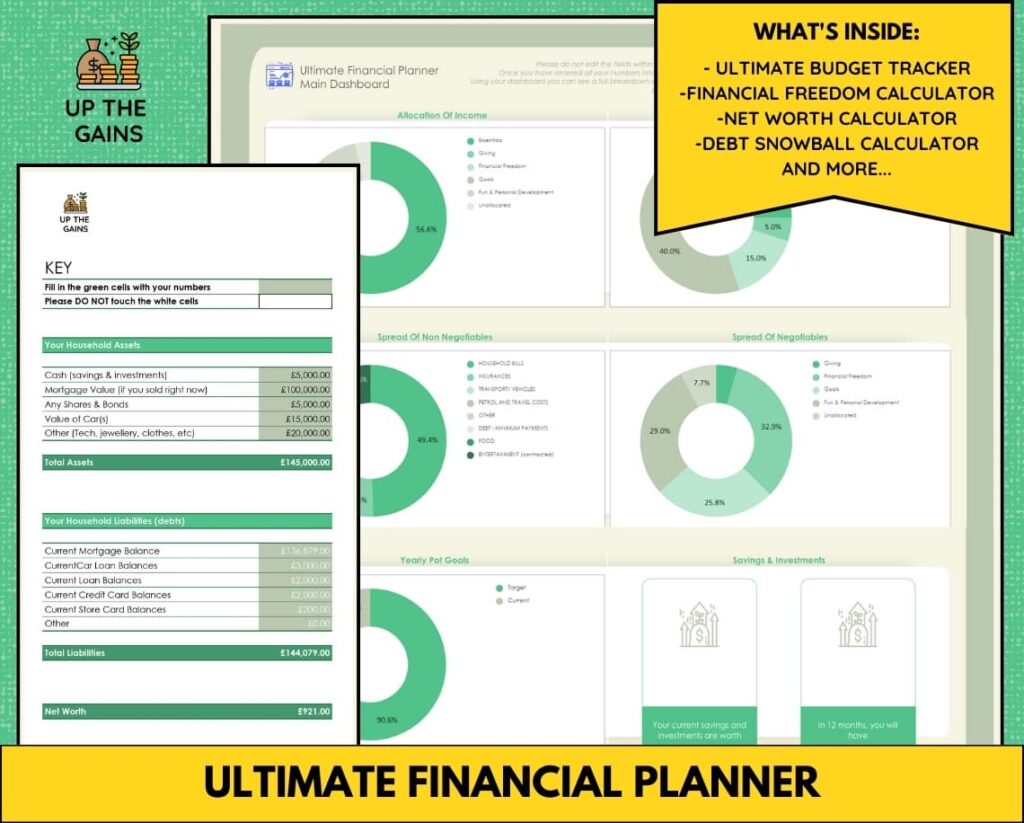
Sammie Ellard-King
I’m Sammie, a money expert and business owner passionate about helping you take control of your wallet. My mission with Up the Gains is to create a safe space to help improve your finances, cut your costs and make you feel good while doing it.

Quickfire Roundup:
Before diving into the details, here’s a snapshot: Generally, Britons spend between £15 and £75 on birthday presents for adults, and a modest £10 to £25 for someone else’s child, while splurging a bit more on their own offspring with a range of £50 to £200.
Thoughtfulness trumps extravagance in the UK, so focus on meaningful gifts like books, educational toys or even personalised items. Be savvy by assessing your finances and saving for gifts, ensuring a balance between emotional value and practicality.
With trends leaning towards gift cards, experiences, and electronics, the national average spending on gifts is around the £50 mark.
Deciding how much should you spend on a birthday present can often be a balancing act. It’s important to show appreciation and thoughtfulness without straining your budget.
For me, it’s about knowing your recipient, the situation and how much you’ve got in the bank. Getting these things right will allow you to feel comfortable making the purchase.
In this article, I’ll guide you through various considerations and tips to make an informed decision, ensuring your birthday gift is both meaningful and affordable.
Table of Contents
Average Birthday Present Cost for Adults
On average, individuals tend to spend between £15 to £75 on birthday presents for adults. The precise amount depends on various factors such as the relationship, cultural norms, and personal financial health.
- £69 for your partner
- £15 to £25 for a friend
- £176 for your child
- £10 to £50 for other children
While it is essential to consider your budget, one must also remember that the birthday gift should reflect the importance of the relationship.
According to Your Surprise – you should be spending £15-25 for someone ele’s birthday. Personally I think this number might be slightly low for close friends but is about right for new or just good friends.
Gift spending Stats and Popular Gift Choices

Popular gifts for adults within a £15 to £35 range include books, gourmet chocolates, and accessories. These are generally suitable for acquaintances or colleagues.
For a budget of £35 to £75, choices extend to fragrances, high-quality spirits, or a piece of handmade jewellery, which could be more appropriate for a close friend and or a family member.
If you’re feeling a bit more bouje or it’s an important occasion like an 18th, 21st or 30th birthday you might decide to up your budget. £100-200 would access some designer clothes, high-end fragrances and technology.
For something like a laptop or Ipad, you’re looking at £500+!
For example last year I bought my girlfriend a set of earrings and a bracelet for her birthday from Etsy, which came to £142. Combine this with a night out to the theatre and dinner it came to around £280.
I had saved up for a couple of months to get it all, but I wanted to make her feel special.
Essentially what I’m saying is do what you want but don’t put yourself into financial difficulty doing so!
Magical, Meaningful Items You Can't Find Anywhere Else. Unique Goods Curated For You.
How Much to Spend on Someone Else’s Child’s Birthday gifts

A budget of £10 to £25 is generally considered appropriate for you to spend on birthday gifts for someone else’s child.
This range is considered polite and thoughtful without seeming extravagant or imposing. It’s also in line with what most parents expect and appreciate.
However if you feel like making something don’t feel pressured to put a monetary value to something if you’re on a tight budget. Do what makes sense.
Gift Ideas Within a Budget
Consider options like educational toys, books, or art supplies within this budget. The child’s birthday gift can be both meaningful and budget-friendly. Educational toys and books can contribute to a child’s learning, while art supplies can encourage creativity.
How Much to Spend on My Own Child’s Birthday
For your own child’s birthday, spending between £50 to £200 is typical. However, it’s essential to reflect on your financial situation and family traditions.
Some families place a high value on lavish celebrations, while others may focus on smaller, more meaningful gatherings and gifts.
For my own kids’ birthday gifts or loved ones, I want them to be happy but it doesn’t need to break the bank and you shouldn’t feel pressured into making financial decisions that’ll put you into debt.
Creating a Memorable Experience
Focus on creating memorable experiences, such as a day out or an engaging activity, instead of solely material gifts. This can be particularly rewarding as experiences often leave lasting memories.
For example with your own children you could book a day out to the zoo or host a birthday party at your house!
Planning a birthday can be stressful but there are plenty of ways you can make it fun for both you and your loved ones.
The Importance of Budgeting

Before setting a budget for birthday gifts, it’s vital to assess your personal financial health and monthly expenditures. This assessment will enable you to allocate a reasonable amount for gifts without compromising other financial obligations.
We have some simple tips for household budgeting.
Setting Aside Savings for Gifts
Regularly setting aside a small amount into a dedicated gift fund can be extremely helpful.
This habit not only ensures that you have the budget when an occasion arises but also prevents impulsive overspending.
Also utilise cashback apps for everyday spending to help you build up a bit of a pot. You can also look to get some cashback from your gift purchase.
Analysing Social Norms and Expectations
In the UK, modesty is often valued in gift-giving, and cultural norms generally favour thoughtful gifts over expensive ones.
Being respectful of these norms can be crucial, especially in diverse social circles. Consider the recipient’s background and preferences to ensure that your gift is appropriate and valued.
Relationship with the Recipient
Typically, people spend more on close family members and less on acquaintances or colleagues. It’s also important to consider the nature of your relationship.
For instance, a long-standing friendship may warrant a more significant gift, as it holds sentimental value.
Deciding on the Perfect Gift

Choosing a high-quality and meaningful gift is often more appreciated than an expensive one. People value the thought and effort put into a gift rather than its price tag.
Select gifts that have a personal touch or that you know the recipient has been wanting for a while.
Creating a DIY or personalised gift can add a touch of sentimentality without requiring a high budget.
For instance, a handmade photo album or a customised piece of jewellery can convey your affection and thoughtfulness much more than a generic, store-bought item.
Magical, Meaningful Items You Can't Find Anywhere Else. Unique Goods Curated For You.
Current Gift Spending Data
As of the latest data, the average Briton spends approximately £50 on birthday presents. This amount has been relatively stable over the past few years, reflecting a consistency in consumer habits.
According to a report by Zoovu giving in the UK is worth £145 billion.
Popular Gift Categories and Their Average Costs
Gift cards, experiences, and electronics are among the popular categories for birthday gifts in the UK.
Balancing Emotion with Practicality

Gift-giving is not just a tradition but an expression of love and appreciation. The psychological benefits of giving are immense, including strengthening bonds and boosting happiness for both the giver and the recipient.
Moreover, selecting a gift that resonates with someone can foster a deeper emotional connection and often acts as a physical representation of the relationship.
It’s important to remember that the intention behind the gift carries weight and can contribute to the emotional value of the gift.
Practical Tips for Making a Decision
When deciding how much to spend on a gift, it’s important to weigh the emotional significance against financial practicality. This involves considering your budget, the recipient’s tastes, and the nature of your relationship. Additionally, planning ahead can make a huge difference.
Look for sales or discounts on items you know the recipient will love, and consider DIY gifts that can be more cost-effective while still holding sentimental value.
It’s also helpful to communicate with others who know the recipient well to gain insights into what might be most appreciated.
Frequently Asked Questions (FAQ)
How Much Does the Average Person Spend on a Birthday?
The average person in the UK spends around £50 on a birthday present. However, this can vary based on relationship and individual circumstances.
It’s also worth considering that social circles and traditions play a role in this spending pattern.
For instance, in a group where elaborate gifting is common, individuals might tend to spend more. On the other hand, in a more modest setting, a heartfelt, less expensive gift might be the norm.
For me, it depends on whether they are close friends or just a good friend. Some friends I don’t buy gifts for but I’ll send out the party invitations and get everyone together but for others at milestone birthdays I’ll splash out. It has to suit you and you’ll know deep down what’s right.
How Much Should I Spend on My Girlfriend’s Birthday Gift?
On average, £50 to £150 is considered a reasonable range for a girlfriend’s birthday gift. It’s important to focus on thoughtfulness and match the gift to her interests and preferences.
The stage of the relationship can influence spending; in the early stages, a more modest but thoughtful gift might be ideal. As the relationship progresses, you may choose to invest more in a gift that signifies the deepening bond.
How Much Should I Spend on My Boyfriend’s Birthday Gift?
Similar to gifts for girlfriends, spending between £50 to £150 on your boyfriend’s birthday gift is common. Opt for something that reflects his hobbies, tastes, or something that he has mentioned wanting.
In addition to this, taking into account any shared financial goals or plans can also be insightful.
For example, if you are saving together for a holiday or a significant purchase, a modest but meaningful gift could be appreciated as it demonstrates consideration for shared objectives.
How Much Should You Spend on Housewarming Gifts
In the UK, it is common to spend between £10 to £50 on a housewarming gift. For close friends and family members, spending towards the higher end of this range or slightly above might be appropriate, whereas for acquaintances or neighbours, a more modest gift in the £10 to £20 range would be suitable.
Common gifts include home decor items, plants, gourmet food baskets, or practical kitchen gadgets. It’s important to consider the tastes and preferences of the homeowner, and sometimes a thoughtful, personalised gift can be more appreciated than something more expensive.
Conclusion - How Much Should You Spend On A Birthday Present
In conclusion, deciding how much to spend on a birthday gift involves a combination of factors including your budget, the recipient’s preferences, and social norms.
It’s crucial to strike a balance between being generous and practical. Remember that the thoughtfulness and effort behind a gift are often more valuable than the price tag.
Share on social media
Disclaimer: Content on this page is for informational purposes and does not constitute financial advice. Always do your own research before making a financially related decision.




